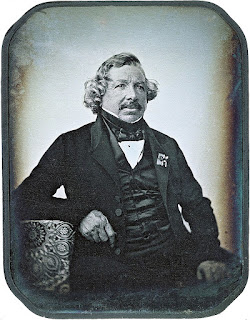To a pageboy: "'Go 'long,' I said; 'you ain't more than a paragraph'"--A Connecticut Yankee in King Arthur's Court
Here are some more of the greatest people of the 19th century. (Being on the second list doesn't make them less great than those on the first; I just didn't get around to them earlier.)
J. Nicephore Niepce (1765-1833) & Louis Daguerre (1787-1851): French inventors of photography revolutionizing our perception of the world and ultimately transforming visual art.
Ludwig Van Beethoven (1770-1827): German composer central in the transformation from classical to romantic music.
George Stephenson (1781-1848): British engineer who designed the first railway with steam locomotion, starting a revolution in transportation.
Michael Faraday (1791-1867): British scientist who invented the dynamo, allowing the transformations of electriciy.
Samuel Morse (1791-1872): American artist who invented the telegraph, leading to a communications revolution.
Alexander Pushkin (1799-1837): A poet-novelist who ranks as the towering figure of early Russian literature. (Gore Vidal remarked that while American children read Dick and Jane, Russian kids read Pushkin!)
Giuseppe Verdi (1813-1901) & Richard Wagner (1813-83): Outstanding composers in the field of Italian and German opera respectively.
Louis Pasteur (1822-95): French biologist who transformed our understanding of bacteria.
Henrik Ibsen (1828-1906): Norwegian playwright who developed a new "psychological" drama centred on middle-class characters rather than the elite.
John D. Rockefeller (1839-1937): American businessman who transformed Standard Oil into the first giant corporation, at a time when petroleum machinery was taking the lead the industrial revolution. His controversial "robber baron" tactics and de facto monopoly led to the first anti-trust laws.
Thomas Edison (1847-1931): American inventor whose laboratories produced the first light bulb, phonograph and motion pictures, often making use of the new electrical technology.
Alexander Graham Bell (1847-1922): Scottish-American inventor who produced the first telephone, improved other people's inventions and pioneered the teaching of the deaf.
Meiji the Great (1852-1912; a.k.a. Mutsuhito): Japanese emperor whose Imperial court was restored to power by 1868 overthrow of the Tokugawa shogunate, who oversaw his realm's first economic modernization and the development of a post-feudal nation state with ambitions to join the great powers.
I have a feeling I'll think of a lot of people who should have been included...















2 comments:
You have included no women -- in any field. You have included no British novelist or poet. One of these days, Dr. Matthews, we shall agree on something, but I may be dead first.
I included China's Dowager Empress in Part I.
Post a Comment